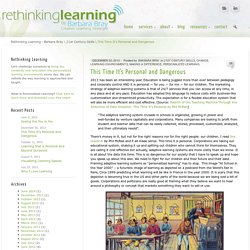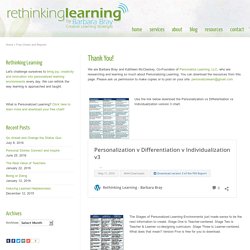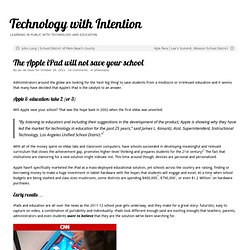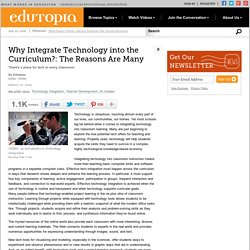

It is Personal and Dangerous Now. 2013 has been an interesting year.

Education is being juggled more than ever between pedagogy and corporate control AND it is personal — for you — for me — for our children. The marketing strategy of adaptive learning systems is that of 24/7 services that you can access at any time, in any place and at any pace. Education has adopted this language to reduce costs with business-like customization and streamlined productivity.
The expectation is for a flexible education system that will also be more efficient and cost effective. Rethinking Learning – Barbara Bray – Free Charts and Reports. We are Barbara Bray and Kathleen McClaskey, Co-Founders of Personalize Learning, LLC, who are researching and learning so much about Personalizing Learning.

You can download the resources from this page. Please ask us permission to make copies or to post on your site: personalizelearn@gmail.com Use the link below download the Personalization vs Differentiation vs Individualization version 3 chart. Thinking about a lack of thinking. Lately I have been thinking a lot about thinking.

More specifically, I have been thinking hard about the absence of thought in education. The absence of thought in students, teachers, administrators and policy-makers. The Impossible Dream. Could Free Resources Widen the Digital Divide? - Digital Education. Ten things about computer use in schools that you don't want to hear (but I'll say them anyway) Bored with the Education Naysayers. Okay.

The Apple iPad will not save your school. Administrators around the globe are looking for the ‘next big thing’ to save students from a mediocre or irrelevant education and it seems that many have decided that Apple’s iPad is the catalyst to an answer.

Apple & education: take 2 (or 3) Will Apple save your school? That was the hope back in 2002 when the first eMac was unveiled: “By listening to educators and including their suggestions in the development of the product, Apple is showing why they have led the market for technology in education for the past 25 years,” said James L. Articles in alphabetical order - Educational Technology. Web 2.0 What Went Wrong? - Trebor Scholz 'journalisms' - Collectivate.net. Listen to Slide Cast Course DescriptionIs it feasible to live ethical, meaningful lives in the context of the Social Web today? This course formulates a critique of the Social Web. Based on the rapid growth of participation in social life online and in mobile space-- from social news, referral, social search, media sharing, social bookmarking, tagging, virtual worlds and social networked games, social mapping, IM, social networking, blogging and dating, this class formulates a critical analysis of the international Social Web with regard to privacy, intellectual property, and the utilization of social creation of value through the lens of a small number of case studies in the areas of education, political activism, and art.
The course starts with a history of computer-facilitated networked sociality. In some U.S. schools, librarians are no longer saying, “Shh!” By Nick Pandolfo Buffy Hamilton speaking at a conference on digital media and education in Chicago.

(Photo by Nick Pandolfo) Buffy Hamilton, who calls herself “The Unquiet Librarian,” holds the phone receiver away from her ear at Creekview High School library in Canton, Ga., revealing a cacophony of noise in the background. Technology in Schools Faces Questions on Value. Jim Wilson/The New York Times Students using an interactive whiteboard, part of an ambitious technology plan in the Kyrene School District in Arizona.

To hear from more experts, and to share your own predictions for the future of technology in the classroom, visit the Bits blog. Jim Wilson/The New York Times Molly Siegel and Christian Dedman, both 7, worked together with a laptop during a class in the Kyrene School District in Arizona. In this technology-centric classroom, students are bent over laptops, some blogging or building Facebook pages from the perspective of Shakespeare’s characters. The Power of Us. Why Parents and Journalists Need to "Speak Research" In recent weeks, papers worldwide have punched parents' guilt buttons yet again by hyping a study that claims screen time harms children.

Editors seemingly competed to give the Iowa State University research the most extreme headline: "Watching TV and playing video games can 'DOUBLE risk of getting ADHD'," "Video games decrease attention span," and the clear winner from the UK's Express, TV DAMAGES A CHILD'S BRAIN. Planes that land safely aren't news, so "TV makes your kids dumb" is a much more compelling headline than "A limited amount of carefully-chosen programming can contribute to early learning, especially with parental co-viewing.
"
E-Learning ISSN 2042-7530 - Volume 8 Issue 2 (2011) Contents. Transforming American Education: revolution or counter-revolution? - E-Learning and Digital Media Volume 8 Number 2 (2011) Introduction to Edcamp: A New Conference Model Built on Collaboration. Why Integrate Technology into the Curriculum?: The Reasons Are Many. VIDEO: An Introduction to Technology Integration Running Time: 5 min.

Technology is ubiquitous, touching almost every part of our lives, our communities, our homes. Yet most schools lag far behind when it comes to integrating technology into classroom learning. Many are just beginning to explore the true potential tech offers for teaching and learning. Properly used, technology will help students acquire the skills they need to survive in a complex, highly technological knowledge-based economy. Integrating technology into classroom instruction means more than teaching basic computer skills and software programs in a separate computer class.
Many people believe that technology-enabled project learning is the ne plus ultra of classroom instruction. The myriad resources of the online world also provide each classroom with more interesting, diverse, and current learning materials.